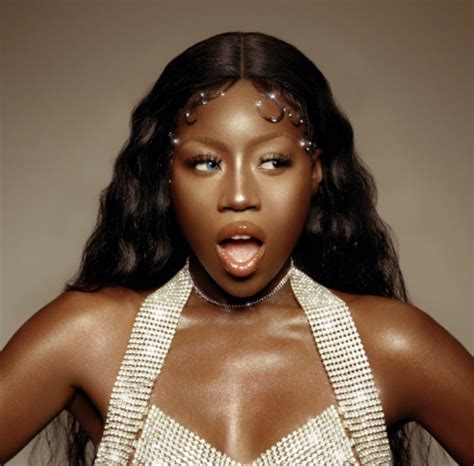A Quote by Ayesha Curry
My mom is Jamaican and Chinese, and my dad is Polish and African American, so I'm pretty mixed. My nickname in high school was United Nations. I was fine with it, even though I identify as a black woman. People don't realize it hurts my feelings when someone looks at my hair or my eyes, and says, "But you're not actually black. You're black, but you're not black black, because your eyes are green." I'm like, "What? No, no, I'm definitely black." Even some of my closest friends have said that. It's been a bit touchy for me.
Quote Topics
Actually
African
African American
American
Because
Been
Bit
Black
Chinese
Closest
Closest Friends
Dad
Definitely
Even
Eyes
Feelings
Fine
Friends
Green
Hair
High
High School
Hurts
Identify
It Hurts
Like
Looks
Me
Mixed
Mom
My Dad
My Mom
Nations
Nickname
People
Polish
Pretty
Realize
Said
Says
School
Some
Someone
Though
Touchy
United
United Nations
Woman
Your
Related Quotes
People don't realize it hurts my feelings when someone looks at my hair or my eyes, and says, 'But you're not actually black. You're black, but you're not black black, because your eyes are green.' I'm like, 'What? No, no, I'm definitely black.' Even some of my closest friends have said that. It's been a bit touchy for me.
I'm an African woman, I suppose these thoughts torture me more than they do black American people, because it's like watching my own children trapped in a car that's sinking to the bottom of a lake and being impotent to save them'the black Americans have their own holocaust going on. You see the black man erasing black children from the landscape, you see black women desperately trying to get the black man's attention by wearing blonde hair and fake blue eyes, 500 years after he sold her and their children across the ocean.
Black is confusing. Where does the line start and stop with what is black and what isn't black? People that are mixed-race, or, imagine being from Sri Lanka or Bangladesh, people might say you're black but your features are so non-black, like you've got straight hair, you've got like a sharper nose, or such.
There are more than 100 million African women who go topless at some point in the day, each and every day, to honor both God and our ancestors. So being in a country like America where nothing is hated more than the image of the black woman, even by black people'because her womb produces the black man and makes us black'I find it of grave importance to implement African images, and especially to produce media images that acknowledge the sexual power and fertility of black women.
I would say I'm black because my parents said I'm black. I'm black because my mother's black. I'm black because I grew up in a family of all black people. I knew I was black because I grew up in an all-white neighborhood. And my parents, as part of their protective mechanisms that they were going to give to us, made it very clear what we were.
Black women are some of the most colorful women in the world. We come in all shadeshave so many hair textures..eye colors..body types. In this generation, it's sad to see so many black girls claiming ethnicities that they know nothing about in hopes of impressing a man or appearing 'exotic'. So many people act as if being black and beautiful is impossible. It's not. If we wanna get technical and look at our history, almost every black American is mixed. But we must stop implying that a woman's beauty comes from a part of her that is not black.
While I might not have a specific experience that is fully American, there is still a knowledge, something that I logically understand as a black woman and a black woman who is existing in America and a black woman who is in the diaspora that are just known quantities that I think anyone can relate to who is black.
I, however, like black. It is a color that makes me comfortable and the color with which I have the most experience. In the darkest darkness, all is black. In the deepest hole, all is black. In the terror of my Addicted mind, all is black. In the empty periods of my lost memory, all is black. I like black, goddammit, and I am going to give it its due.
I felt like it was a courageous show [Black-ish] from the beginning. We are a black family - we're not a family that happens to be black. But the show is not even about us being black. The show is about us being a family. That is groundbreaking - on TV, the black characters either happen to be black or they're the "black character," where everything they say is about being black. I think that's the genius.


































